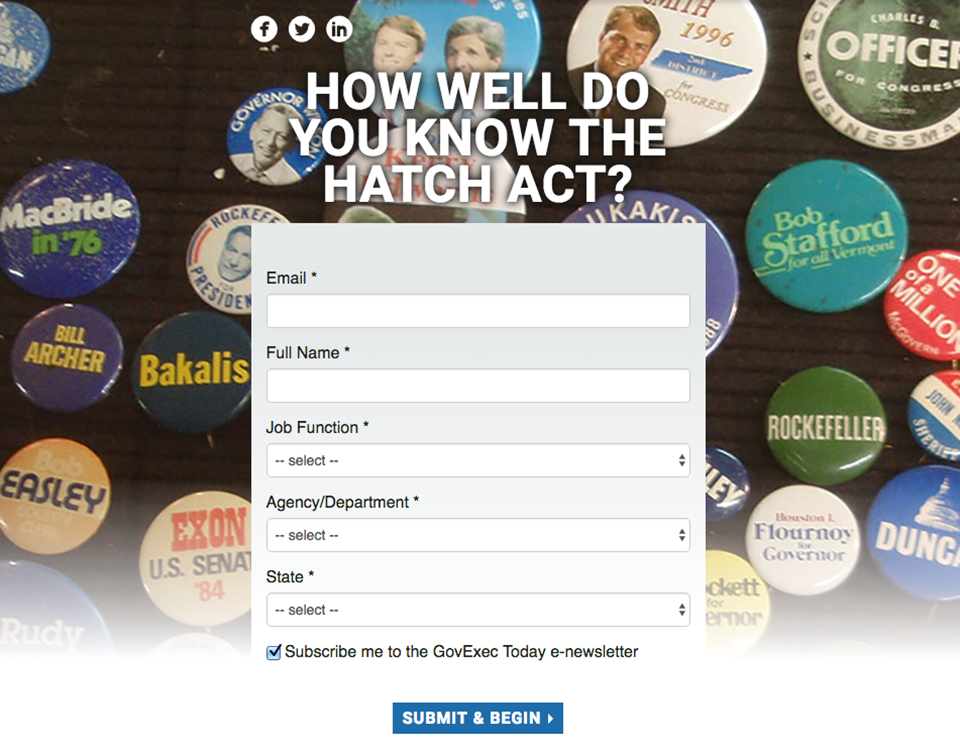Incoming Oversight Chair Blasts New Hatch Act Guidance Limiting Talk of ‘Resistance’ in the Office
Rep. Cummings calls Trump-era adjustments "radical" and perhaps "unconstitutional."
Weeks before he is scheduled to assume the chairman’s powers at the House oversight panel, Rep. Elijah Cummings, D-Md., on Friday took aim at the new Hatch Act guidance released last month by the Office of Special Counsel.
OSC’s evolving efforts to advise agency employees on how to avoid violations during discussions of such Trump-era language as “Make America Great Again” and “The Resistance” may be unconstitutional and should be rescinded, Cummings wrote in a Dec. 7 letter to Special Counsel Henry Kerner.
Cummings called the guidance—which OSC modified two days after releasing it because of multiple questions from agencies—“a radical departure from past guidance” that “is certain to have a chilling impact on federal employees.”
Going even further, Cummings suggested that the guidance “is so out of step with OSC’s past interpretations of the law that it raises concerns about whether OSC itself is engaging in inappropriate political activity.”
Cummings noted that he agrees with OSC’s interpretation of the law that forbids agency employees while on duty from expressing criticism or praise that is directed toward the success or failure of a political party, candidate or group. But, he continued, “absent evidence that the criticism or praise is so directed, criticism or praise of an administration’s policies and actions is not considered political activity.”

How well do you know the Hatch Act?
He singled out the OSC’s recent example of an employee who criticizes the Trump administration’s decision to move the U.S. embassy in Israel from Tel Aviv to Jerusalem. “An employee who strongly criticizes or praises that decision during a workplace discussion with a colleague in the days immediately following the decision is less likely to be engaging in political activity than one making those same statements in the run-up to the next presidential election—when the decision will likely have been out of the news for several years—to a colleague that the employee knows has strong feelings about the subject,” OSC had said.
“OSC’s guidance is wrong,” Cummings argued. “There is no time that criticizing a policy of the sitting president or any other politician is a violation of the Hatch Act. It is only when an employee advocates for or against the success or failure of a candidate or political party that it implicates the Hatch Act. “
He pointed to OSC’s guidance on its own website that says, “Generally, all federal employees may discuss current events, policy issues, and matters of public interest at work or on duty. The Hatch Act does not prohibit employees at any time, including when they are at work or on duty, from expressing their personal opinions about events, issues, or matters, such as healthcare reform, gun control, abortion, immigration, [the] federal hiring freeze, etc.”
Cummings also challenged OSC’s warning against use of the words “#resist” or “The Resistance”—commonly used by opponents of Trump. “Resist is a term that can be used in many different contexts,” his letter noted. “OSC’s guidance assumes that using a generic term that is not used as an official campaign slogan for any current partisan political candidate is political activity. Just because the term is sometimes used to reference a political philosophy does not make it political activity. “
As current ranking member on the House Oversight and Government Reform Committee, Cummings requested that Kerner rescind both the original guidance dated Nov. 27 and the modified version issued on Nov. 30. He asked for a briefing by Dec. 14, an estimate on the number of inquiries from agencies on the new guidance and copies of OSC documents related to the development of the guidance.
An OSC spokesman confirmed receipt of the letter. "OSC takes Rep. Cummings’s concerns seriously and we look forward to working with his office to answer any questions," the spokesman said.
This story has been updated to include a response from OSC.
NEXT STORY: The Dangerous ‘New Phase’ for Donald Trump







